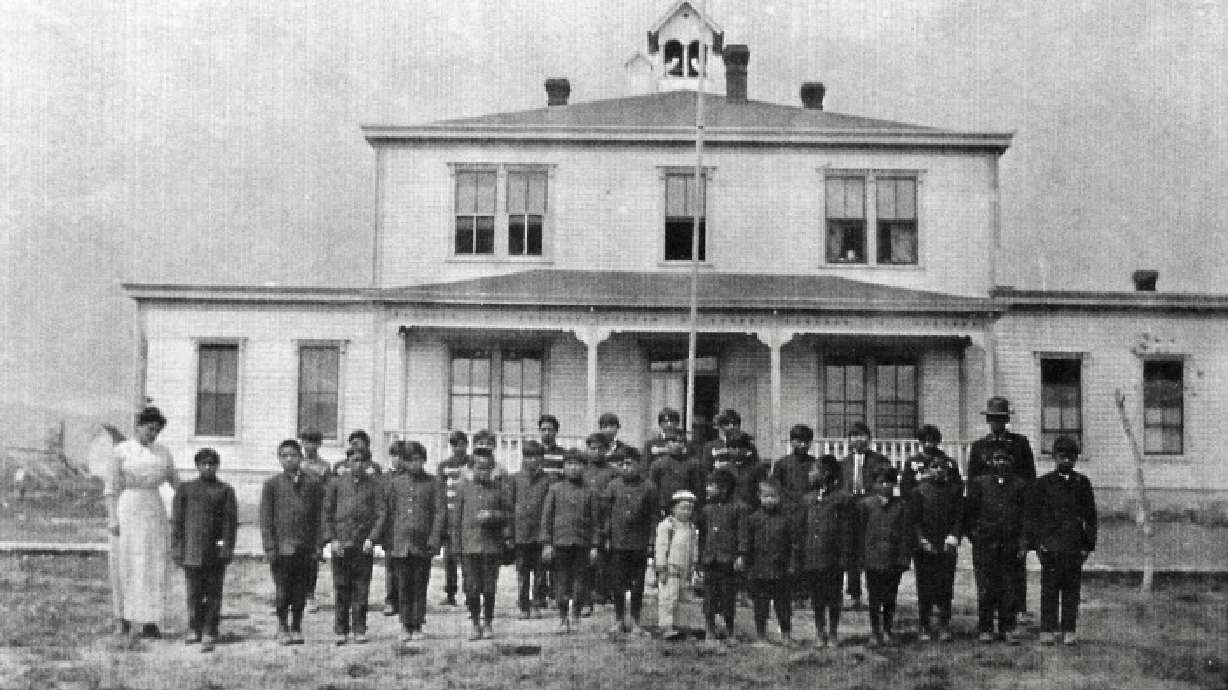Estimated read time: 4-5 minutes
This archived news story is available only for your personal, non-commercial use. Information in the story may be outdated or superseded by additional information. Reading or replaying the story in its archived form does not constitute a republication of the story.
SALT LAKE CITY — Maybe the era of Native American boarding schools is past. But that doesn't mean the lingering effects and trauma caused by the system have faded away, says Dena Ned, an associate University of Utah professor and director of the University of Utah's Indigenous Social Work Scholars Program.
"Those traumatic events changed behavior, changed culture and were passed on to the next generation. That's what's most difficult, because of the ripple effect on families and communities now today," she said.
The Natural History Museum of Utah at the U. is hosting an event Saturday to raise awareness about the impact the boarding school system has had and commemorate those victimized by it. Ned, a citizen of the Chickasaw Nation of Oklahoma, will moderate a panel discussion on the issue as part of the varied activities, which go from 11 a.m. to around 2 p.m.
Organizers are tying the events to National Day for Truth and Reconciliation, marked on Sept. 30 each year in Canada to honor victims of the Indigenous boarding school system in that country. It's the first time the Natural History Museum has hosted such an event, but organizers note that Utah, as home to seven boarding schools in years past, had a role in the "troubled" boarding school history.

"It is essential that we honor the survivors, their families and those who never returned while supporting the collective healing journey. Only through recognition and reflection can true reconciliation and understanding be achieved," Jason Cryan, the museum executive director, said in a statement. Museum admission is required to attend the event, though enrolled members of Native American tribes in the United States and their kids may enter for free.
Ned, likewise, said events like Saturday's commemoration serve as a step forward in trying to process the continuing impact of the boarding school system.
"History impacts today. And so to have this acknowledgment, or commemoration, of a day for truth and reconciliation, that's incredible," she told KSL.com. "I don't think we move past the impact, but I think we can move toward an understanding of a history that is often left out of a dominant society conversation."
According to the museum, hundreds of thousands of Native American children from 1869 to the 1960s were taken from their homes and placed in boarding schools run by the federal government and other entities. "These institutions aimed to dismantle Native cultures and communities by assimilation, stripping students of traditional clothing, hair and other cultural symbols and practices. Students at the schools were often subjected to physical, sexual, cultural and spiritual abuse," according to the museum.
Read more:
According to the National Native American Boarding School Healing Coalition, Utah was home to seven boarding schools for Native Americans. Last year, Utah State University researchers using ground-penetrating radar uncovered the sites of multiple suspected graves of Native American children in and around the site of the former Panguitch Indian Boarding School in Panguitch, which operated from 1904-1909, according to the coalition.
"More research is required to determine if graves exist at the sites of other schools," said Margaret Chamberlain, who handles communications for the museum.
Ned described the boarding school system as one phase of evolving federal policy toward Native Americans over the years and an "extension of the history of colonization" that started with the arrival of European explorers in the Americas.
The litany of "historical injustices" Native Americans have faced stemming from government policy, including forced attendance at boarding schools, contributes "to a legacy of trauma," she said. "How are you supposed to heal? ...You doubt yourself and you doubt ... your elders or your community because of the power and the force of others to say we were wrong. That's intergenerational trauma."
Tribal communities move past the traumas they have faced by "taking back their systems and institutions" lost at the hands of the U.S. government, she said. Still, the process is fraught with uncertainty. "How many generations does it take to get past that?" Ned said.
Saturday's activities also include Native drumming and dancing, presentations by indigenous and U. officials, and the screening of a short film focused on the story of a South Dakota boarding school, "Remember the Children."










